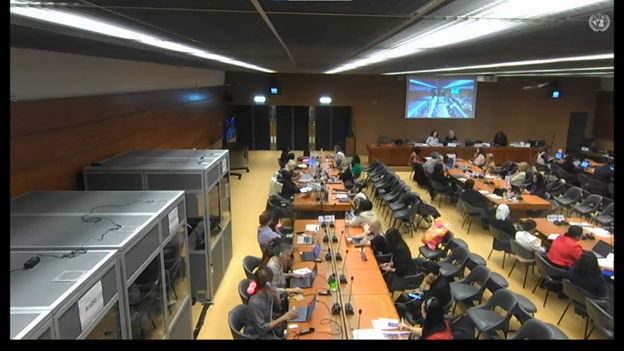 |
| The logo for the Committee on the Elimination of Discrimination against Women, which monitors compliance with the Convention, both of which are abbreviated as CEDAW. Image credit: UN Office of the High Commission for Human Rights |
The number of women incarcerated in Chinese prisons has grown faster than the population of incarcerated men over the past decade, and women are disproportionately represented in criminal cases involving unorthodox religious groups. These are the main points highlighted by Dui Hua in its submission to the Committee on the Elimination of All Forms of Discrimination against Women (CEDAW)’s review of China.
CEDAW, which also stands for the Convention on the Elimination of All Forms of Discrimination against Women and is sometimes described as an “international bill of rights for women,” is the treaty and human rights instrument adopted by the United Nations that provides guidance for nations to combat discrimination faced by women. Nations that have signed and ratified CEDAW – which includes all but six UN member states – are required to submit reports to the Committee on their compliance with the Convention every four years. NGOs are invited to make submissions informing country reports, which Dui Hua did for China’s, considered during CEDAW’s 85th session in the week of May 8, 2023.
Dui Hua’s statement largely focused on female prisoners charged under Article 300, “organizing or using a cult to undermine implementation of the law.” The statement noted that women account for 8 percent of the prison population in China – a figure similar to that of the United States – but are thought to make up more than 40 percent of prisoners incarcerated for violating Article 300 from 1998-2016. More so, court records suggest that sentencing for these cases is comparatively harsh and that instances of clemency are rare. (The statement notes that there may have been an increase in clemency over the last two years but the lack of consistent data and transparency in legal processes makes this difficult to confirm.)
Charts 1 and 2: Gender breakdown of unorthodox religious prisoners accused of violating Article 300 in the PPDB as of March 31, 2023.*
 |
| *Gender is not known for all cases. Image credit: The Dui Hua Foundation |
The submission builds on the research Dui Hua initially published in its report “The Persecution of Unorthodox Religious Groups in China,” which identified a gender imbalance in sentencing under Article 300. Dui Hua’s Political Prisoner Database (PPDB) holds records on 11,400 women who have been subject to coercive measures for violating Article 300 due to their participation in unorthodox religious groups, which the Chinese Communist Party regards as cult organizations practicing non-state sanctioned faiths.
The statement also noted that women are the main target of negative stereotypes in China’s anti-cult propaganda. This messaging often relies on stereotypes of middle-aged, rural women being “weak-willed and psychologically vulnerable” and more vulnerable to “coercion or monetary enticements from cult organizations.” Such messaging, which comes from both national and regional organizations, itself seems to violate Article 5 of CEDAW which mandates that state parties take all appropriate measures to eliminate “prejudices and customary and all other practices which are based on the idea of inferiority or the superiority of either of the sexes or on stereotyped roles for men and women.”
 |
| An image from the opening session of CEDAW’s 85th session on May 8, 2023. Image credit: UN Web TV |
Another focus of Dui Hua’s submission to China’s state report was the decline in judicial transparency. Dui Hua ended its submissions by recommending that the Chinese government increase the use of non-custodial measures and clemency for women prisoners and improve judicial transparency, writing:
Dui Hua urges the Chinese government to resume providing meaningful access for the public to judicial documents, including indictments, court judgments, and decisions of all cases, regardless of the criminal offense involved. Transparency is particularly lacking in provinces with high populations of ethnic minorities. It also helps the public understand the reasons why women are placed in custody for peacefully pursuing their religious faith and other criminal offenses.
This is not the first time Dui Hua has made a statement to a UN body concerning China’s treatment of female prisoners. Dui Hua previously made submissions to CEDAW during China’s previous review in 2014 and, more recently, to the Working Group on Discrimination Against Women in Law and Practice in June 2019.
Of the 193 UN member states, 189 have ratified CEDAW, binding them to the treaty and mandating that they participate in regular review every four years. The United States has not ratified CEDAW, placing it among a small group of countries – Iran, Somalia, Sudan, Tonga, Palau – and the Holy See that have yet to bind themselves to the treaty.
Read the report “The Persecution of Unorthodox Religious Groups in China”
